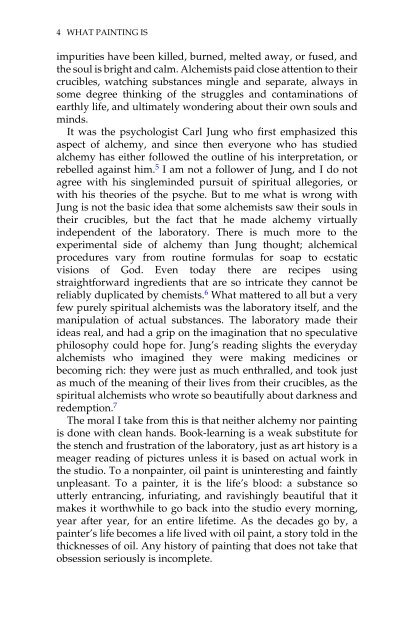What Painting Is: How to Think about Oil Painting ... - Victoria Vesna
What Painting Is: How to Think about Oil Painting ... - Victoria Vesna
What Painting Is: How to Think about Oil Painting ... - Victoria Vesna
You also want an ePaper? Increase the reach of your titles
YUMPU automatically turns print PDFs into web optimized ePapers that Google loves.
4 WHAT PAINTING IS<br />
impurities have been killed, burned, melted away, or fused, and<br />
the soul is bright and calm. Alchemists paid close attention <strong>to</strong> their<br />
crucibles, watching substances mingle and separate, always in<br />
some degree thinking of the struggles and contaminations of<br />
earthly life, and ultimately wondering <strong>about</strong> their own souls and<br />
minds.<br />
It was the psychologist Carl Jung who first emphasized this<br />
aspect of alchemy, and since then everyone who has studied<br />
alchemy has either followed the outline of his interpretation, or<br />
rebelled against him. 5 I am not a follower of Jung, and I do not<br />
agree with his singleminded pursuit of spiritual allegories, or<br />
with his theories of the psyche. But <strong>to</strong> me what is wrong with<br />
Jung is not the basic idea that some alchemists saw their souls in<br />
their crucibles, but the fact that he made alchemy virtually<br />
independent of the labora<strong>to</strong>ry. There is much more <strong>to</strong> the<br />
experimental side of alchemy than Jung thought; alchemical<br />
procedures vary from routine formulas for soap <strong>to</strong> ecstatic<br />
visions of God. Even <strong>to</strong>day there are recipes using<br />
straightforward ingredients that are so intricate they cannot be<br />
reliably duplicated by chemists. 6 <strong>What</strong> mattered <strong>to</strong> all but a very<br />
few purely spiritual alchemists was the labora<strong>to</strong>ry itself, and the<br />
manipulation of actual substances. The labora<strong>to</strong>ry made their<br />
ideas real, and had a grip on the imagination that no speculative<br />
philosophy could hope for. Jung’s reading slights the everyday<br />
alchemists who imagined they were making medicines or<br />
becoming rich: they were just as much enthralled, and <strong>to</strong>ok just<br />
as much of the meaning of their lives from their crucibles, as the<br />
spiritual alchemists who wrote so beautifully <strong>about</strong> darkness and<br />
redemption. 7<br />
The moral I take from this is that neither alchemy nor painting<br />
is done with clean hands. Book-learning is a weak substitute for<br />
the stench and frustration of the labora<strong>to</strong>ry, just as art his<strong>to</strong>ry is a<br />
meager reading of pictures unless it is based on actual work in<br />
the studio. To a nonpainter, oil paint is uninteresting and faintly<br />
unpleasant. To a painter, it is the life’s blood: a substance so<br />
utterly entrancing, infuriating, and ravishingly beautiful that it<br />
makes it worthwhile <strong>to</strong> go back in<strong>to</strong> the studio every morning,<br />
year after year, for an entire lifetime. As the decades go by, a<br />
painter’s life becomes a life lived with oil paint, a s<strong>to</strong>ry <strong>to</strong>ld in the<br />
thicknesses of oil. Any his<strong>to</strong>ry of painting that does not take that<br />
obsession seriously is incomplete.


